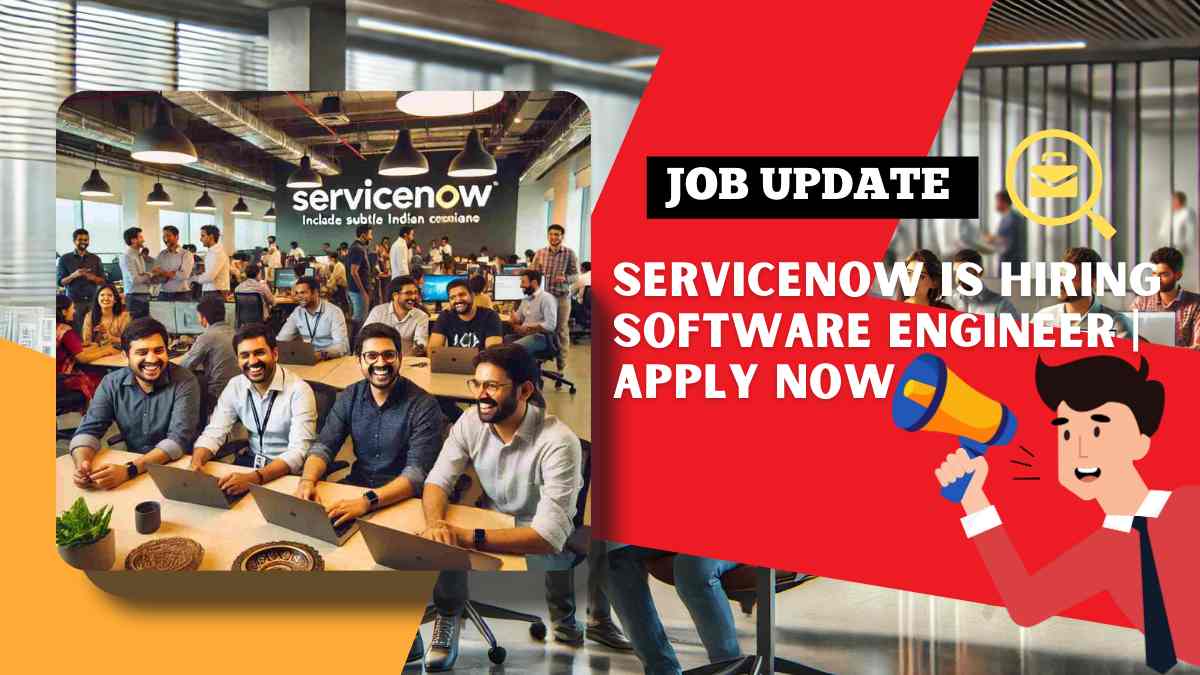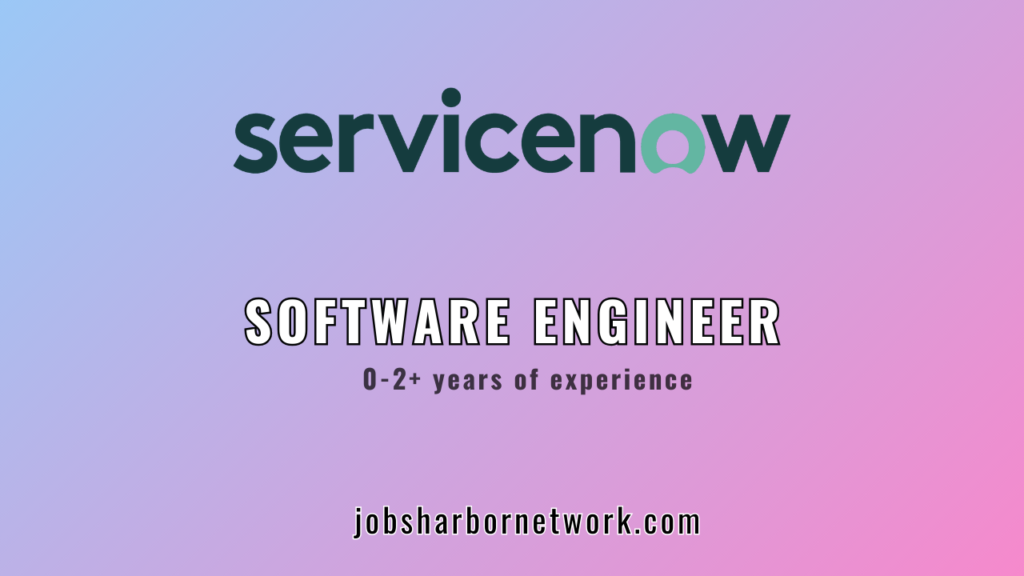In the rapidly evolving landscape of digital transformation, businesses are constantly seeking ways to streamline operations, enhance efficiency, and deliver exceptional experiences. At the heart of this pursuit lies ServiceNow, a powerful cloud-based platform that revolutionizes enterprise service management. But a platform, no matter how robust, is only as effective as the hands that mold it. This is where the ServiceNow Software Engineer steps in – a critical and highly sought-after professional who transforms business needs into intelligent, automated workflows.
This article will delve deep into the world of the ServiceNow Software Engineer, exploring their pivotal role, the technical and soft skills they wield, the dynamic career path they navigate, and the exciting future that awaits them in an increasingly digital-first world.
Understanding ServiceNow: The Platform of Platforms
Before dissecting the engineer’s role, it’s essential to grasp the essence of ServiceNow itself. Far from being just an IT Service Management (ITSM) tool, ServiceNow has evolved into a comprehensive "platform of platforms." It offers a suite of cloud-native applications designed to manage and automate enterprise-wide services across various domains, including:
- IT Service Management (ITSM): Incident, Problem, Change, and Request Management.
- IT Operations Management (ITOM): Discovery, Event Management, Service Mapping, Cloud Management.
- HR Service Delivery (HRSD): Employee onboarding, case management, HR knowledge base.
- Customer Service Management (CSM): Customer service cases, self-service portals.
- Security Operations (SecOps): Security Incident Response, Vulnerability Response.
- Governance, Risk, and Compliance (GRC): Policy and Compliance, Risk Management.
- Field Service Management (FSM): Dispatching, mobile task management.
- Low-code/No-code Development (App Engine Studio): Empowering citizen developers to build custom applications.
ServiceNow’s strength lies in its ability to connect these disparate functions, breaking down departmental silos and creating seamless, end-to-end digital workflows. It provides a single system of record for various processes, enabling transparency, automation, and data-driven decision-making.
The Core Role: What Does a ServiceNow Software Engineer Do?
A ServiceNow Software Engineer is not merely an administrator; they are a developer, an architect, and a problem-solver. Their primary responsibility is to design, develop, implement, and maintain custom applications and solutions within the ServiceNow platform to meet specific business requirements. This involves a blend of configuration, customization, and pure coding.
Let’s break down their key responsibilities:
- Custom Application Development: Utilizing ServiceNow’s App Engine and Studio, engineers build scoped applications from the ground up. This involves defining data models, creating user interfaces (forms, lists), developing business logic (Business Rules, Script Includes), and integrating with other systems.
- Platform Configuration and Customization: This is a foundational aspect. Engineers configure various elements such as:
- Workflows and Flow Designer: Designing automated processes for tasks like incident resolution, change approval, or HR onboarding.
- Forms and UI Policies: Tailoring user interfaces to display relevant information and enforce data integrity.
- Business Rules and Client Scripts: Implementing server-side and client-side logic to automate actions, validate data, and enhance user experience.
- Service Portals: Developing and maintaining user-friendly self-service portals using web technologies (HTML, CSS, AngularJS/React).
- Notifications and Reports: Setting up automated email notifications and creating insightful reports and dashboards.
- Integration Development: ServiceNow rarely operates in a vacuum. Engineers are responsible for integrating the platform with other enterprise systems (e.g., HRIS, CRM, monitoring tools, identity providers) using various methods like:
- REST and SOAP APIs: Building inbound and outbound integrations for data exchange.
- MID Server: Facilitating communication between the ServiceNow instance and on-premise systems.
- JDBC, LDAP, SFTP: Configuring data sources and integrations for specific scenarios.
- Scripting and Coding: JavaScript is the lingua franca of ServiceNow development. Engineers write server-side scripts (using the Glide API) for complex business logic, data manipulation, and integrations, and client-side scripts to enhance user interaction and validate input. They also work with HTML, CSS, and potentially Angular or React for Service Portal development.
- Testing and Quality Assurance: Ensuring the reliability and performance of developed solutions is paramount. This includes unit testing, integration testing, and supporting user acceptance testing (UAT).
- Performance Optimization: Identifying and resolving performance bottlenecks, optimizing code, and ensuring the platform remains responsive and scalable.
- Documentation: Creating detailed technical documentation for developed solutions, configurations, and integrations to ensure maintainability and knowledge transfer.
- Collaboration and Communication: Working closely with business analysts, solution architects, project managers, and end-users to understand requirements, propose solutions, and gather feedback throughout the development lifecycle.
- Platform Upgrades and Maintenance: Assisting with platform upgrades, ensuring custom solutions remain compatible, and performing regular maintenance tasks.
Essential Skills for Success
To excel as a ServiceNow Software Engineer, a robust blend of technical prowess and critical soft skills is indispensable.
Technical Skills:
- JavaScript: This is non-negotiable. Proficiency in JavaScript is the backbone of server-side scripting (Business Rules, Script Includes, Workflow Activities, UI Actions) using the Glide API and client-side scripting (Client Scripts, UI Policies) for enhancing user experience and enforcing logic.
- ServiceNow Platform Knowledge: Deep understanding of the platform’s architecture, data model (tables, fields, relationships), security model (ACLs), core applications (ITSM, HRSD, etc.), and development best practices.
- Web Technologies: Familiarity with HTML, CSS, and potentially client-side frameworks like AngularJS (used in older Service Portals) or React (for newer UI Builder components) is crucial for portal development and UI customization.
- API Integration: Strong understanding of REST and SOAP APIs, JSON, and XML for building robust integrations with external systems.
- Database Concepts: While ServiceNow abstracts much of the database interaction, a basic understanding of relational databases and SQL concepts can be beneficial for complex data manipulations and queries.
- Debugging and Troubleshooting: The ability to efficiently diagnose and resolve issues within the platform, utilizing tools like the JavaScript debugger, log files, and network monitoring.
- Version Control: Experience with Git or other version control systems for managing code changes and collaborating with teams.
- Agile Methodologies: Familiarity with Agile and Scrum frameworks, as many ServiceNow projects are executed in an iterative manner.
Soft Skills:
- Problem-Solving: The ability to analyze complex business problems, break them down, and devise innovative and scalable solutions within the platform.
- Communication: Excellent verbal and written communication skills are vital for gathering requirements, explaining technical concepts to non-technical stakeholders, and collaborating effectively within a team.
- Analytical Thinking: The capacity to critically evaluate information, identify patterns, and make informed decisions.
- Attention to Detail: Precision is key in development. Minor errors can have significant impacts on system functionality and user experience.
- Adaptability and Continuous Learning: The ServiceNow platform undergoes two major releases annually, introducing new features and capabilities. Engineers must be proactive in learning and adapting to these changes.
- Teamwork: Most projects involve collaboration with other engineers, business analysts, and project managers.
- Customer Focus: Understanding the end-user’s needs and designing solutions that are intuitive and enhance their experience.
The Career Path and Growth Opportunities
A career as a ServiceNow Software Engineer offers a clear and rewarding progression path.
- Entry-Level: Often starts as a Junior ServiceNow Developer or Associate Engineer, focusing on configurations, minor customizations, and learning the platform’s fundamentals. Obtaining the ServiceNow Certified System Administrator (CSA) and Certified Application Developer (CAD) certifications are excellent starting points.
- Mid-Level: Progresses to ServiceNow Software Engineer or Senior Developer, taking on more complex development tasks, leading smaller projects, and mentoring junior team members. Specializing in specific modules (e.g., CIS-ITSM, CIS-HRSD) becomes common.
- Advanced/Leadership: Roles like Lead ServiceNow Engineer, Technical Architect, or Solution Architect involve designing large-scale solutions, defining architectural patterns, providing technical leadership, and acting as a subject matter expert. Many also move into consulting roles, advising multiple clients on their ServiceNow implementations.
- Specializations: Engineers can specialize in areas like Service Portal development, integrations, specific workflows (e.g., SecOps, GRC), or even cutting-edge areas like AI/ML implementations within ServiceNow.
The demand for skilled ServiceNow professionals continues to outpace supply, leading to competitive salaries and robust job security.
Why Choose a ServiceNow Engineering Career?
There are several compelling reasons to pursue a career as a ServiceNow Software Engineer:
- High Demand and Market Value: Organizations across every industry are adopting ServiceNow, creating a constant need for skilled engineers. This translates to excellent job prospects and competitive compensation.
- Impactful Work: Engineers directly contribute to digital transformation, making tangible improvements to how businesses operate, increasing efficiency, and enhancing employee and customer experiences.
- Continuous Learning and Innovation: The platform’s regular updates and expansion into new domains ensure that engineers are always learning new technologies and solving novel challenges.
- Versatility: ServiceNow is used in diverse industries, from healthcare and finance to government and technology, offering a wide range of environments and challenges.
- Strong Community Support: ServiceNow boasts a vibrant global community (Now Community) and extensive documentation, providing ample resources for learning and problem-solving.
- Future-Proof Skillset: As businesses increasingly rely on automation and digital workflows, the skills gained as a ServiceNow engineer remain highly relevant and adaptable.
Challenges and Considerations
While rewarding, the role also comes with its challenges:
- Keeping Up with Releases: The platform updates twice a year, requiring engineers to continuously learn new features and ensure their solutions remain compatible.
- Platform-Specific Constraints: While powerful, ServiceNow has its architectural nuances and best practices. Engineers must balance customization with adhering to platform standards to ensure maintainability and upgradeability.
- Complexity of Large-Scale Implementations: Enterprise-level ServiceNow deployments can be incredibly complex, requiring meticulous planning, rigorous testing, and strong governance.
- Balancing Configuration vs. Customization: Deciding when to use out-of-the-box features versus when to develop custom code is a constant architectural consideration. Over-customization can lead to technical debt.
The Future of the ServiceNow Software Engineer
The future for ServiceNow Software Engineers is bright and dynamic, driven by several key trends:
- AI and Machine Learning Integration: Features like "Now Assist" (Generative AI), Virtual Agent, and predictive intelligence are becoming more prevalent. Engineers will increasingly work on integrating and leveraging these AI capabilities to create smarter workflows and more intuitive user experiences.
- Hyperautomation: The convergence of RPA, AI, ML, and process mining within the ServiceNow ecosystem will lead to more sophisticated end-to-end automation, requiring engineers to design and implement highly integrated solutions.
- Low-code/No-code Expansion: While software engineers will always be needed for complex development, the growth of App Engine Studio and other low-code tools will shift some of their focus towards architecting solutions, governance, and mentoring citizen developers, rather than solely coding every component.
- Enhanced User Experience: With the "Next Experience" UI, there’s a strong emphasis on modern, intuitive interfaces. Engineers will be crucial in leveraging tools like UI Builder to craft exceptional user experiences.
- Specialization in Niche Areas: As ServiceNow expands its offerings, demand for engineers specializing in areas like GRC, SecOps, OT (Operational Technology) management, or specific industry solutions will grow.
Conclusion
The ServiceNow Software Engineer is a pivotal player in the modern enterprise, bridging the gap between business needs and technological capabilities. They are the architects and builders of the digital workflows that power organizations, driving efficiency, innovation, and superior service delivery. With a robust skill set, a commitment to continuous learning, and an understanding of the platform’s vast potential, a career as a ServiceNow Software Engineer offers immense growth, impact, and a secure footing in the ever-evolving world of enterprise software. For those passionate about technology, problem-solving, and shaping the future of digital work, this role presents an exciting and highly rewarding journey.

